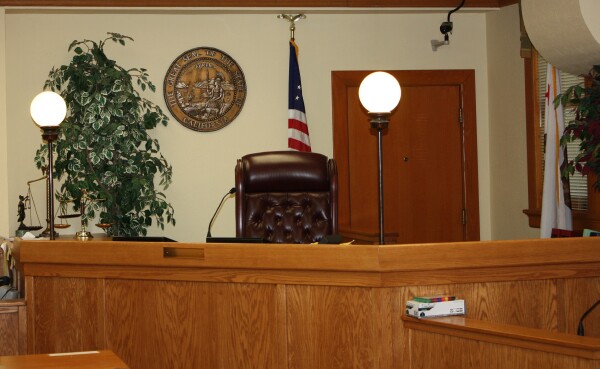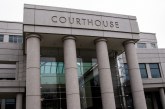 On Friday, former West Sacramento Police Officer James Reeder took the stand. Mr. Reeder testified that he arrived a couple of minutes after the altercation began between Ernesto Galvan and Officers Schlie and Farrington.
On Friday, former West Sacramento Police Officer James Reeder took the stand. Mr. Reeder testified that he arrived a couple of minutes after the altercation began between Ernesto Galvan and Officers Schlie and Farrington.
He said it was pitch black and all he could see was the amber lights of the police “overheads.” He then saw the skirmish and called out, asking if there were anyone else involved. Officer Farrington said, “just him. ” That would be Fermin Galvan. Mr. Reeder admitted under cross-examination that Fermin Galvan was 30 feet from the incident, not participating, not yelling to his brother, but nevertheless he considered him a threat.
The interesting exchange occurred somewhat earlier, as Deputy Public Defender Martha Sequeira began the cross-examination. She had just established that Mr. Reeder had left the West Sacramento Police Department in October of 2008. She had previously asked if he still worked as a police officer, but an objection by Deputy District Attorney Carolyn Palumbo was sustained by Judge Timothy Fall.
She then asked if he had left on good terms, the people again objected, and Mr. Reeder clearly did not want to respond. Nor did he want to respond to whom he was currently working for, despite the fact that in February he had testified he was working for a security company in West Sacramento, All Phase Security.
At this point, Judge Fall excused the jury, giving them an early break.
He asked Ms. Sequeira why she was pursuing this line of questioning, to which Ms. Sequeira responded, “bias.” She then explained if Mr. Reeder had left West Sacramento on bad terms, there could be bias.
With Mr. Reeder still on the stand, now with no jury but still in open court, Judge Fall attempted to clarify Mr. Reeder’s status, so he could determine what was relevant and admissible.
Mr. Reeder indicated that he did not want to say and was not comfortable saying where he worked at this time, but he did acknowledge he had a private job now.
Deputy DA Ryan Couzens had just entered the courtroom before this episode, and he went up and whispered something into Ms. Palumbo’s ear.
It was at this time that DDA Palumbo objected to this discussion being in open court, and in her words there were “bloggers all over the place, blogging about this case” and she feared someone would read it and become biased. She asked that the courtroom be cleared and they could then explore this line outside of the public view.
Judge Fall said that personnel and employee records are very protected, but this is by the officer’s own statement, so he questioned the confidentiality in this instance Judge Fall said that normally, personnel stuff is confidential until there is a decision made about it.
Ms. Sequeira said this courtroom was open to the public and media, this is of public interest, and that during the February trial, Mr. Reeder had had no problem stating that he worked for a private security company. She said it is not a government job, therefore there is no evidence code exception.
DDA Palumbo indicated that her concern was not about Mr. Reeder working for All Phase Security, it was that Ms. Sequeira was attempting to ask whether he had been terminated, which would be in violation of the in limine motions.
Ms. Sequeira stated that she was not trying to ask, “were you terminated,” but rather trying to get at this issue as to whether Mr. Reeder’s views of the West Sacramento Police Department changed from 2005 to the present.
Judge Fall said the real issue is what Mr. Reeder presently thinks about the West Sacramento Police Department.
Ms. Sequeira argued that there are inconsistencies, indicating possibly different feelings now, and she would like to explore whether, at the time of previous hearings and trials, he felt the same as he does now.
Ms. Palumbo then accused Ms. Sequeira of trying to get around the ruling on the motion in limine, which would be getting dangerously close to violating the Court’s decision, and be disingenuous.
Judge Fall said to avoid personal attacks unless you are certain. DDA Palumbo said, well, she “surmises,” and Judge Fall said it would be wise to limit such judgments.
Judge Fall ultimately ruled that he would allow the line of questioning for Mr. Reeder’s feelings about the West Sacramento Police Department. He then went into a lengthy discussion on why he believes having the public in the courtroom is paramount. He argued that one of the wisest things we have done in this country was develop the Bill of Rights and that he would only close his courtroom to the public under the most egregious of conditions, or when the matter is statutorily required to take place in private.
He also noted that he had read newspaper accounts of the trial in both the Woodland and Davis papers, and he felt that the coverage had missed some key points. He had already instructed the jurors to avoid reading about the case in the newspaper. He said he had not read any blogs but felt that blogs were different in that the jurors would have to actively seek out the website, as opposed to a newspaper which could be encountered inadvertently.
It seemed that there was something the DA’s Office was attempting to hide, not just from the jury but from the public. By objecting so forcefully and directly mentioning that there are people “blogging” on this case, it alerted us to something more to examine.
The Vanguard explored Mr. Reeder’s employment further, and learned that he indeed works for All Phase Security, based in West Sacramento, as their Operations Manager. He was apparently fired from the West Sacramento Police Department, but we were unable to determine why that was the case. All Phase Security was apparently started by another terminated former West Sacramento Police Officer.
Honestly, if the DA had not raised such a fuss this would have been a non-issue for us, and we would not have pursued looking further into this story.
In the process of the proceedings, we developed a new measure of respect for Judge Fall, who has at times appeared as brash and abrasive, even to the point of abusiveness. However, on this day he stood strongly for the process of open government and having a courtroom open to the public.
I believe many other judges would have closed the courtroom immediately upon the request of the Deputy District Attorney. However, to his credit, Judge Fall never appeared even close to doing that.
Part of this incident was clearly instigated by Deputy DA Ryan Couzens, for whom we have had criticisms on numerous occasions. Much of this would have long been forgotten had he simply stayed out of it.
Once the proceedings returned in front of the jury, Ms. Sequeira simply asked Mr. Reeder if his views about the West Sacramento Police Department had changed since 2005, and he said they had not. She may have felt this would clue the jury in to the fact that he was fired, but this is only our speculation and this may have been too subtle a point to make anyway.
Nevertheless, there is considerable question about Mr. Reeder’s contact with Fermin Galvan during the incident. Moreover, he came across as confrontational and a little slow, compared to the other two officers who were very effective and had a likable demeanor on the stand. Finally, he denied having used his baton during the course of the events, but could not explain why, if that were the case, it was booked into evidence.
—David M. Greenwald reporting





Rules and laws denying access to work-related history are a double-edged sword. Most of us know–and many support–the notion that circumstances surrounding a termination should have limited public access. Oftentimes job separations involve personal medical issues that are nobody’s business.
Yet, secrets suggest guilt, and fuel leaps of imagination that are usually sinister in scope, especially involving police employees. A prime illustration is this story.
In the instant case, a trial involving a former police employee finds a defense attorney probing the circumstances of his termination in front of a judge and jury.
The questions asked were illegal (note that the questions she asked had nothing to do with current attitude towards his former department; rather, how he left the department). Opposing counsel successfully objected and the questioner had to rephrase questions that were within the law’s boundaries.
But the damage was done. The improper Defense questions were calculated and deliberate, because all who hear this exchange naturally wonder, “What did he do?” Further, the context of event implies that it has a direct bearing of the veracity of the prosecution case. The defense won that round, and only had to suffer a mild admonishment from the judge.
What if the circumstances of the termination had nothing to do with the case or the officer’s credibility? Since we apparently have free rein in speculating, that’s a viable alternative. The officer could have been fired for bad debts or multiple rule violations of procedures having no bearing on this incident. For that matter, are we even sure he was terminated for cause?
We’ll never know if or what, but the former officer is nonetheless twice publicly accused by inference as shown in this court hearing, and repeated and reinforced in this blog.
Now for the clincher and the other edge of the sword. The former officer cannot respond should he be falsely accused because his legal representatives will warn on the danger of legal precedent. Should he speak out publicly and waive his protected personnel law right that act will be noted in all future court actions of a similar nature. To speak out in one’s own defense risks voiding the original law that protects every Californian having personnel employment records.
Phil: I think your take is exactly correct except I of course would go the other way with it and argue this is why everything or most reasonable things should be open. Transparency allows full light to bear on a situation and the jurors are probably smart enough to figure out if it has bearing on the case. By trying to hide things, you create unnecessary suspicion.
The witness (ex-officer) is representing the West Sac Police account of an arrest yet he was terminated from that dept for some reason. The Defense should be able to explore a couple of areas-
Did the termination have anything to do with falsifying police reports? – that is relevant because he is sitting on the Stand providing the police side of the story.
Did the termination have anything to do with using excessive force and tending to inflame situations? – that is important because the defendants are claiming the police initiated the fight.
The jury should be allowed to hear that information to help them determine the credibility of the witness and to help them appreciate the police actions on the night being discussed. Sure, it is embarassing to be terminated and have to talk about it, but the circumstances might be relevant to the case. Several minutes of embarassing personnel related questions does much less harm than the impact of an incorrect conviction.
dmg: “Phil: I think your take is exactly correct except I of course would go the other way with it and argue this is why everything or most reasonable things should be open. Transparency allows full light to bear on a situation and the jurors are probably smart enough to figure out if it has bearing on the case. By trying to hide things, you create unnecessary suspicion.”
What if the fired officer was terminated for reasons he does not want made public bc it would embarrass him/jeopardize his current job, that have nothing to do with the case at hand? Why should he have to reveal that to satisfy your sense of “transparency”? There clearly was something that had gone on behind closed doors the defense was not permitted to delve into, but attempted to anyway despite its impropriety – questionable courtroom tactics. Yet you would condemn the prosecution if they tried to do the same sort of thing. You can’t have it both ways.
However, the question in my mind would be if this officer was fired for the use of excessive force. Curative measures taken to fix a problem are usually not admissable, except for purposes of impeachment (attacking credibility of witness). However, credibility of witness can be attacked by showing bias. So I have to assume this witness was not fired for use of excessive force, otherwise that would have been admissable I would think.
Frankly, I don’t understand the defense’s line of questioning here or maybe I’m missing something. Why would a policeman who was fired from his job have a better feeling towards the police after the firing than before? The implication, it would seem, is the police officer changed his position to somehow be more favorable in his testimony now than before, showing bias in his testimony? To me, the “bias” issue was a pretext to put the credibility of this officer in a bad light despite a previous ruling that whether he was fired or not was off limits.
Jurors = people too stupid to get out of jury duty. This is a common belief of many and commonly said in the DA’s office and may be accurate sometime. And those that want to serve on a jury are normally kicked off for either too much education, where they live, what color they are or other “bias” reasons. Then people wonder why we get some really bad juror decisions.
As for the termination or what the cop thinks about the Department – here is the reality and all Cops, DA’s and Judges know it!
[quote] Police departments protect officers so they will not be held liable for their actions. The DA protects officers that help their case. Officers don’t say anything that can make them liable and don’t want their Department or DA pissed at them or they will lose that protection.[/quote]
This is standard operating procedure for all Cops in the US. I am not saying they are dirty or lie or plant evidence, it is just the facts. The DA pulls this all them, he withholds evidence or information that hurts his case and uses the excuse “it is not his job to do the defense’s job”. Same thing when cops make a mistake or say or does something that hurts the case, all will protect him and ensure it does not come out. But a little side motivation is, the DA will threaten, maybe give a friendly warning is better, and tell the cop if you let this information out then you could be held liable and I might have to charge you. So even if a cops wants to do the right thing and be open and completely honest, he knows that he will get screwed, sued, lose his job or get charged, so I wonder if any bias or coercion is there?
The system is designed to protect the system.